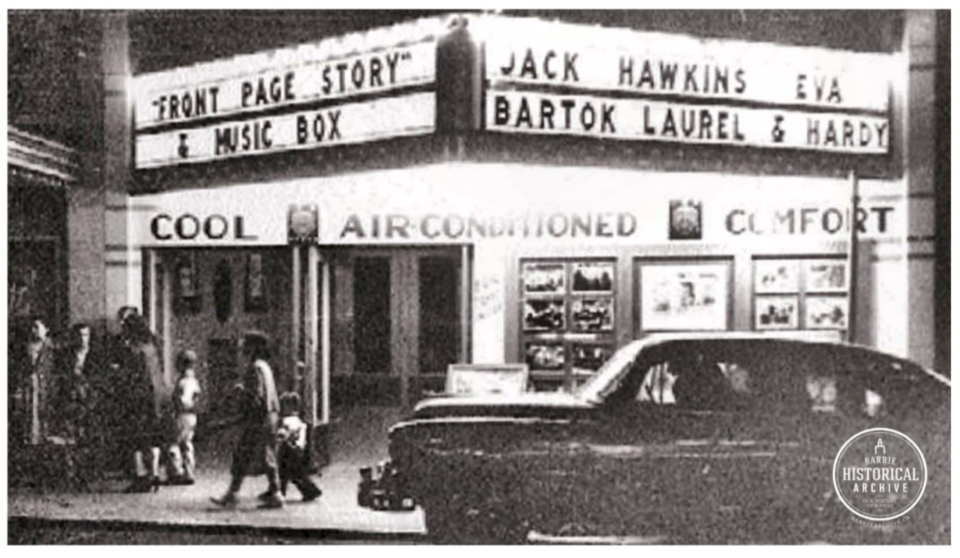Saying goodbye to Imperial Cinemas/Uptown Theatre in downtown Barrie is hard, says Claudine Benoit.
“It’s been the backdrop to so many amazing memories for the film festival,” says the director of the Barrie Film Festival. “We’ve shown over 1,000 feature films over the years.”
The iconic theatre sits in the centre of a row of commercial buildings of a Dunlop Street West strip now being demolished.
The easternmost section of the block, where the planned two 32-storey condominium towers replacing the shops is advertised, was home to the Roy Lem Restaurant for many years beginning in 1954, as well as a tea shop and hardware store before that.
Most recently, the History Barbershop, Parlour and Gentlemen’s Quarter claimed part of the prominent space.
Over the years, several businesses, restaurants, markets, car dealers and gas pumps have found a home on the strip that was part of what was once known as the theatre block.
The Imperial, more recently called the Uptown Theatre, wasn’t a historically designated building, but as part of what had once been the city’s theatre district, it does have a rich history.
The Imperial Theatre opened in 1937 on what was then called Elizabeth Street and was one of three theatres in what was pronounced in the newspapers of the day as “the only town of its size in the district to have three theatres which are placed within a hundred square yards of each other.”
The Capital Theatre was next door and across the street was the Roxy.
“When the planning approvals were underway, the emotion and the sentiment that was tied into the Uptown Theatre came out and was certainly heard a lot about during the planning approval process,” says Michelle Banfield, Barrie’s director of development services.
Banfield herself recalls coming to Barrie from her home in Bradford to see her first movie at the Dunlop Street theatre.
“I remember my grandparents taking me up to see Star Wars on one of my birthdays,” she says.
For Benoit, meanwhile, it’s been a good ride.
The downtown theatre became home to the Screen One monthly screenings of films off the beaten track presented through the MacLaren Art Centre. The group screened its first movie, Smoke — starring Harvey Keitel, William Hurt and Stockard Channing — in November 1995.
“It just continued from there,” says Benoit.
The not-for-profit Barrie Film Festival has been independent of the MacLaren since 2005.
The last screening at Uptown Theatre was Ordinary Love starring Liam Neeson and Lesley Manville on the cusp of the COVID-19 pandemic, on March 5, 2020.
Along with the films, guests — those involved in the making of the movie being shown — were often on hand to discuss their work.
Atom Egoyan, director of The Sweet Hereafter and Where the Truth Lies, presented Ararat during Screen One in 2003.
Canadian director Michael McGowan, who also directed One Week, Score: A Hockey Musical, was on hand for his film, Saint Ralph, at a 2004 Screen One presentation.
Actor Maury Chaykin was at the 2004 festival for Wilby Wonderful.
Bruce McDonald also came to Barrie for his concert film called This Movie is Broken in 2010 for the 13th annual Barrie Film Festival.
Blues singer Rita Chiarelli and producer Jennifer St. John discussed the documentary Music from the Big House at the 2011 Reel Stories festival.
And actors Adam Beach, Ryan Black, Jennifer Podemski and Kevin Hicks showed up for the 20th anniversary screening of Dance Me Outside.
The Barrie Film Festival will continue on with plans to make the south-end Galaxy Cinemas its new home. The festival rolled its first film there last week and Benoit says the response has been good.
Meanwhile, the festival, which has had to adapt during the pandemic, has made some movies available online for its Reel Stories, receiving positive feedback. Festival organizers may launch a survey to get a sense of whether to continue with some online screenings in addition to the in-person offerings.
Benoit also hopes to continue using the Sunset Barrie Drive-in Theatre for some summer screenings as well.
“We’re really about people having that collective screening experience,” she says, indicating that watching films in person will continue to form the foundation of the festival’s showings.



